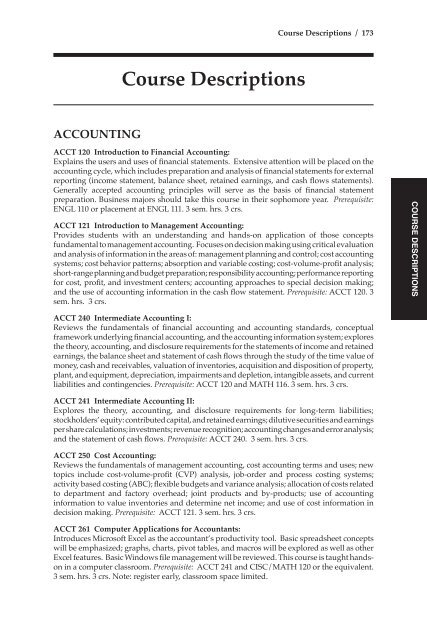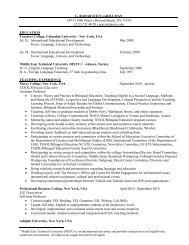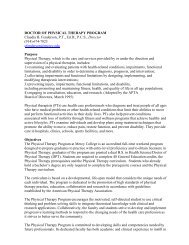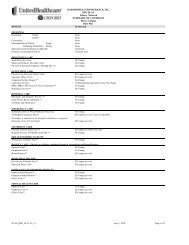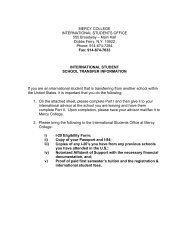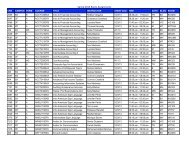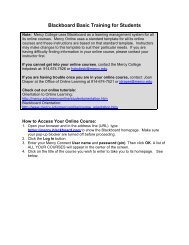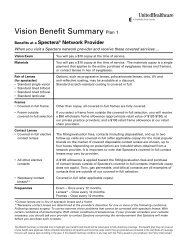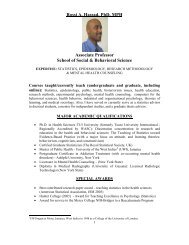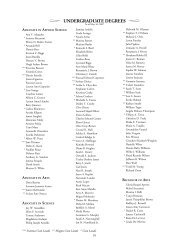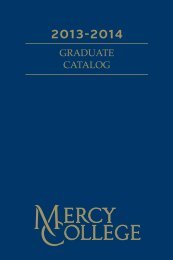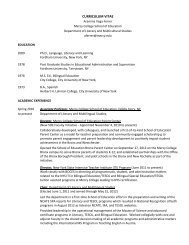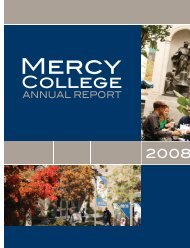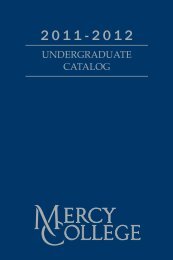UNDERGRADUATE CATALOG - Mercy College
UNDERGRADUATE CATALOG - Mercy College
UNDERGRADUATE CATALOG - Mercy College
Create successful ePaper yourself
Turn your PDF publications into a flip-book with our unique Google optimized e-Paper software.
Course Descriptions / 173<br />
Course Descriptions<br />
Accounting<br />
ACCT 120 Introduction to Financial Accounting:<br />
Explains the users and uses of financial statements. Extensive attention will be placed on the<br />
accounting cycle, which includes preparation and analysis of financial statements for external<br />
reporting (income statement, balance sheet, retained earnings, and cash flows statements).<br />
Generally accepted accounting principles will serve as the basis of financial statement<br />
preparation. Business majors should take this course in their sophomore year. Prerequisite:<br />
ENGL 110 or placement at ENGL 111. 3 sem. hrs. 3 crs.<br />
ACCT 121 Introduction to Management Accounting:<br />
Provides students with an understanding and hands-on application of those concepts<br />
fundamental to management accounting. Focuses on decision making using critical evaluation<br />
and analysis of information in the areas of: management planning and control; cost accounting<br />
systems; cost behavior patterns; absorption and variable costing; cost-volume-profit analysis;<br />
short-range planning and budget preparation; responsibility accounting; performance reporting<br />
for cost, profit, and investment centers; accounting approaches to special decision making;<br />
and the use of accounting information in the cash flow statement. Prerequisite: ACCT 120. 3<br />
sem. hrs. 3 crs.<br />
COURSE DESCRIPTIONS<br />
ACCT 240 Intermediate Accounting I:<br />
Reviews the fundamentals of financial accounting and accounting standards, conceptual<br />
framework underlying financial accounting, and the accounting information system; explores<br />
the theory, accounting, and disclosure requirements for the statements of income and retained<br />
earnings, the balance sheet and statement of cash flows through the study of the time value of<br />
money, cash and receivables, valuation of inventories, acquisition and disposition of property,<br />
plant, and equipment, depreciation, impairments and depletion, intangible assets, and current<br />
liabilities and contingencies. Prerequisite: ACCT 120 and MATH 116. 3 sem. hrs. 3 crs.<br />
ACCT 241 Intermediate Accounting II:<br />
Explores the theory, accounting, and disclosure requirements for long-term liabilities;<br />
stockholders’ equity: contributed capital, and retained earnings; dilutive securities and earnings<br />
per share calculations; investments; revenue recognition; accounting changes and error analysis;<br />
and the statement of cash flows. Prerequisite: ACCT 240. 3 sem. hrs. 3 crs.<br />
ACCT 250 Cost Accounting:<br />
Reviews the fundamentals of management accounting, cost accounting terms and uses; new<br />
topics include cost-volume-profit (CVP) analysis, job-order and process costing systems;<br />
activity based costing (ABC); flexible budgets and variance analysis; allocation of costs related<br />
to department and factory overhead; joint products and by-products; use of accounting<br />
information to value inventories and determine net income; and use of cost information in<br />
decision making. Prerequisite: ACCT 121. 3 sem. hrs. 3 crs.<br />
ACCT 261 Computer Applications for Accountants:<br />
Introduces Microsoft Excel as the accountant’s productivity tool. Basic spreadsheet concepts<br />
will be emphasized; graphs, charts, pivot tables, and macros will be explored as well as other<br />
Excel features. Basic Windows file management will be reviewed. This course is taught handson<br />
in a computer classroom. Prerequisite: ACCT 241 and CISC/MATH 120 or the equivalent.<br />
3 sem. hrs. 3 crs. Note: register early, classroom space limited.


